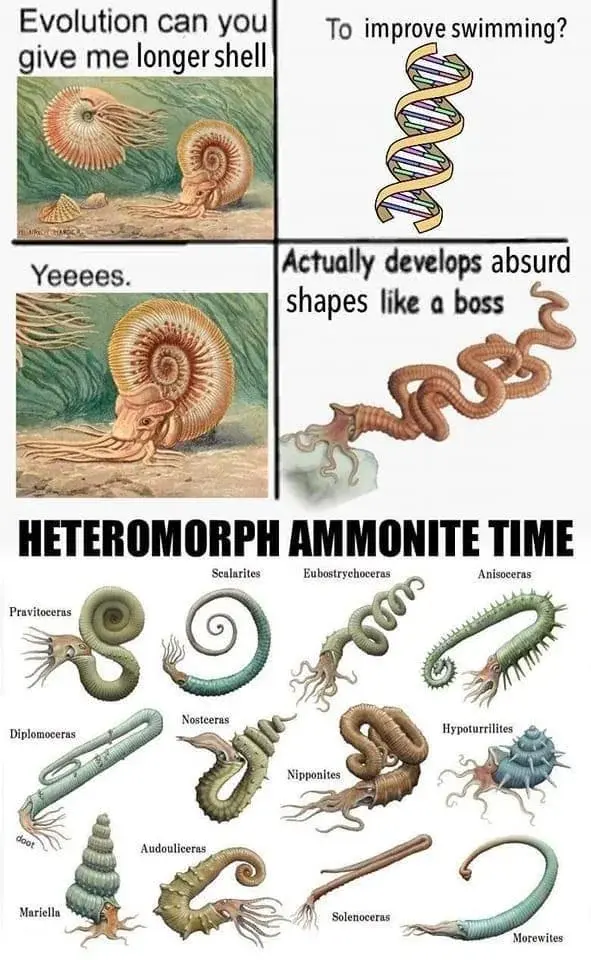The evolutionary origins of trombone
Science Memes
Welcome to c/science_memes @ Mander.xyz!
A place for majestic STEMLORD peacocking, as well as memes about the realities of working in a lab.

Rules
- Don't throw mud. Behave like an intellectual and remember the human.
- Keep it rooted (on topic).
- No spam.
- Infographics welcome, get schooled.
This is a science community. We use the Dawkins definition of meme.
Research Committee
Other Mander Communities
Science and Research
Biology and Life Sciences
- [email protected]
- [email protected]
- [email protected]
- [email protected]
- [email protected]
- [email protected]
- [email protected]
- [email protected]
- [email protected]
- [email protected]
- [email protected]
- [email protected]
- [email protected]
- [email protected]
- [email protected]
- [email protected]
- [email protected]
- [email protected]
- [email protected]
- [email protected]
- [email protected]
- [email protected]
- [email protected]
- [email protected]
- !reptiles and [email protected]
Physical Sciences
- [email protected]
- [email protected]
- [email protected]
- [email protected]
- [email protected]
- [email protected]
- [email protected]
- [email protected]
- [email protected]
Humanities and Social Sciences
Practical and Applied Sciences
- !exercise-and [email protected]
- [email protected]
- !self [email protected]
- [email protected]
- [email protected]
- [email protected]
Memes
Miscellaneous
obviously this makes no sense evolutionarily, they must have been created by mermaids to make various instruments out of their shells.
Assorted butt plug shapes.
Excuse Me?

Kink shaming is uncalled for in this situation.
You did see the username to whom you're responding, yes?
I mean, I suppose they might seem bigger to a predator, and harder to swallow for something that swallows prey whole?
I don't see anything impractical about the one that's just an ordinary ammonite but with spikes.
The Mariella one also looks fairly normal, looks like a number of aquatic snail species
Yeah but it was novel at the time
These are some weird regional Omanytes.
Niche, silly, beautiful
doot.
Just some hard shell noodle bois dooting the best they can
Mighty Heteromorphic Mollusk Rangers
I read hetrimorph ammonite time in “peanut butter jelly time” tune.
Has anyone got some conclusive theories on the functional morphology of this?
This was the "fuck around" era of evolution and being wacky was cool
In my history of life class I was tought it was to do with controlling buoyancy, although all the variation seems odd for that.
Maybe a combination of controlling buoyancy with species identification?
Might be plausible. I’ll have to look it up at one point, maybe there’s some research on this. I think it may be hard to guess why because we don’t have many swimming animals with shells. I don’t know if snails may offer some answers but they are maybe to different in lifestyle.
Probably too different, as snails are benthic, while ammonites where probably nektonic.
Iirc the shells being longer is something about allowing gases in the shell to compress or expand as needed to control bouyancy. I would imagine there is a sac of gas, and the ammonites would siphon water in or out as needed to compress or decompress the gas.
Edit: just looked it up on Wikipedia, it appears the heteromorph ammonites are thought to have maybe been planktonic or benthic.
Definitions for non-nerds:
Benthic means living on or near the sea floor.
Nektonic means free swimming
Planktonic means going with the current as plankton. I should note plankton aren't all tiny, some are visibile to the naked eye. All it means is unable to propel themselves against current.
It is certainly a challenge to keep a large animal with such a thick shell afloat. However that would just explain the immense size of the shells. Their shape is just extremely weird and sometimes I’d even expect it to be detrimental to their ability to navigate the open water. If they were planktonic it would not be as problematic I guess but I still don’t see the functional advantage. Maybe mimicry? But of what?
They look a lot like the calcareous shells of some polychaetes but they have a sedentary lifestyle attached to rock or other substrates which is not what we’d expect for Ammonites.
Maybe it’s a puzzle that will remain unsolved.
